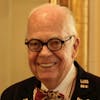The Exciting World of Hospitality Careers - Dr. Peter Ricci, Florida Atlantic University

Dr. Peter Ricci is the Director of the Hospitality and Tourism Management program at Florida Atlantic University (FAU), and in this episode, we discuss recent research on career views in hospitality - and you'll learn why he's so focused on this, the trends he's seeing, and his advice for you.
- Read the research: What people (really) think about working in hotels today
- Follow Peter on LinkedIn
- Learn more about FAU's Hospitality Program
Join the conversation on today's episode on the Hospitality Daily LinkedIn page.
Hospitality Daily isn't just a podcast! Every morning - Tuesday through Friday - I summarize the stories you need to know as a hospitality professional in a short email. Read today's issue and subscribe here.
What are the opportunities for working in hospitality today and how can you share these to attract more talented people to join you? Stick around to hear from one of the top hospitality professors in the US to find out. Dr Peter Ricci is the director of the hospitality and tourism management program at Florida Atlantic University. In this episode, you'll learn why he's so focused on hiring and hospitality, the trends he's seeing and his advice for you. Peter, thank you so much for taking some time to join us today. You've been such an outspoken advocate of hospitality, communicating the benefits of building a career here while, at the same time, speaking some of the hard truths to those in the industry around changes that we need to make in order to recruit and retain talented people. So I have to ask you, with all the things on your plate, why do you focus so much time on hiring in hospitality? You know it's funny.
Peter:I spend so much time because I love this business so much and I want people to feel the joy that I've had out of this career. And we're just coming out of such a horrid time in our history and this is more than just one of our economic ebbs and flows, you know even more traumatic to a lot of people than they've ever experienced at any other time in their life and the mass exodus from hospitality really bothered me. So I'm super happy now because staffing levels are pretty much back to where we think they will be in the short run, and so my message is just hire, try it, love it, stay. If it's not for you, then you know right away. But there's so many people that benefit from a hospitality skill set that it really applies to any business, which is also why I'm so pro hiring and getting people to refine and enhance their hospitality skill set, because they might wind up working the front desk at a dental practice, or they might go into real estate or they might become a financial planner. And how responsive they are to their clients, how strong their communication skills are, how much empathy they have if they work in a veterinarian's office answering the phone they're all hospitality skills. So I guess I'm really diehard about learning and refining hospitality skills and about getting you hired, because those skill sets lead to the most successful entrepreneurs, the most successful business owners and the happiest people because they're helping other people. So it doesn't really even mean that you have to work in a traditional hotel, restaurant, airline, cruise line, casino. It's the skill set more, which is why I'm so passionate about it.
Josiah:Yeah, I couldn't agree more, and it's an amazing career. It's a fascinating space to operate in and, as you mentioned, there's been some recovery in terms of people working in hospitality. At the same time, it seems there's some structural factors going on where this will remain a challenge, at least for the short term, and even if we fully return to pre-pandemic staffing levels. Any business is always going to get better when it brings more talented, empathetic people in, and so I think the way that we think about hiring some of these best people into our business needs to be something that never goes away right. It always should be top of mind. You're all over the media circuit, all over LinkedIn, so I know many of our listeners have come across you in your work, but for those that haven't met you yet, I wonder if we could talk a moment just about your career in hospitality to set the context before we dive into talking a little bit about this research.
Peter:Sure, I've been in hospitality my whole life, from teenager forward restaurants, a little bit of event planning, two very short times with airlines. I lived at C doing events for years for one year Convention and Visitors Bureau for a couple of years promoting the greater Miami destination and then primarily hotels. And I was very lucky in college to have someone teach me from a tourism perspective versus just a hospitality management perspective. So I approached the whole industry very broadly. Whether you're a charter fishing company operator, you're a travel agent, brick and mortar or online, you're doing predictive analytics, it's a big, vast industry that includes all these pieces of moving people, managing people, servicing people, etc. I was lucky that I started teaching part time in my young 20s so I developed a love for teaching on the side and I used it as a way to recruit the best into my organizations because I had them as students. So I approached the industry very globally and I see from an event planner to someone who owns a gas station that's just outside Walt Disney World being in the hospitality business, because most of their customers are visitors. So I approach it very broadly and I've been in academia full time now for over a decade, so now I'm on the teaching side primarily. I run our program at Florida Atlantic University and I just love the business, no matter which side I'm looking at it. And it changes. It changes every five or 10 years. It ebbs and flows. What's hot for this five years might be cooler the next five. The integration of IT, the integration of analytics, artificial intelligence All of this is changing the world, changing our industry right along with it. So I've approached this industry from different angles, but it's part and parcel of my DNA.
Josiah:It's one of the most fascinating places to work because all of these different technologies and trends all intersect in one industry right, and so it makes it a lot of fun If we could kind of spend a few moments talking about this research we did around people that do not currently work in hotels, about what they think about working in hotels or at hotel companies. I know we've been talking a little bit over the past months about this. We went out and talked to thousands of people between the ages of 18 and 40 working outside of the industry. What do they think about working in hotels? How do they think about career planning? One of the first things that kind of stood out was money, or pay was actually their top factor for a majority of people in terms of how they choose career opportunities. Well, career advancement was the top criterion for only 10% of the survey participants. I'm curious for you and Elv that you've seen. Does this surprise you at all?
Peter:It doesn't surprise me, however. Hospitality has never been well known as a high paying industry right out of the gate, so that's always been one of the issues that we've had enticing people to come into the industry, no matter their age. Even if you're a career changer at 55, we've never stood out. One of the real positive takeaways post pandemic is that we're paying better, comparatively, than we ever have before, but it's not surprising to me that that was their number one concern because of inflation and the time we're living in. There are so many metro areas around the world that have become cost prohibitive for a young person to live on their own, or a senior person that doesn't have a significant other spouse to live on his or her own, and so money is a very big thing right now. On their minds, and if you look historically at research, salary usually doesn't come out number one too often. It's usually in the top three or four because it's a necessity to live, but it's been coming out in more things that I'm reading now than ever before on top, and in your survey it was quite a leader in my opinion, so it doesn't surprise me at all. I mean, I live right now in South Florida, which is Miami, fort Lauderdale, palm Beach metro area and housing prices have become astronomical in the past 20 years, and so, with that said, if you have a preconceived notion that hospitality, or hotel management in particular, pays low, no wonder that's their biggest thing that came to the forefront.
Josiah:I'm glad we're having this conversation because, as you pointed out, it seems there has been changes that have taken place over the past couple of years where these jobs are now competitive, right and I guess, kind of with only 10% saying career advancement is their top criteria, this could just be people new in their career and not thinking down the road. You're working with so many students. How are you advising them to think about careers? You know, I guess, balancing the very real consideration where they need to get paid so that they can afford living expenses and so on. But do you feel maybe in people that you're talking with or listening to, there's people not missing the career advancement piece of it a little bit?
Peter:Absolutely, and that's why I try to educate anyone I talk to about the vastness of our industry. I mean you may start by working at Spirit Airlines and then realize you really like the guest contact and wind up at Walt Disney World and then suddenly you're working for Brightline, high Speed Rail or Amtrak. They're all pieces of our business. But you got to find out what you thrive on and what you love and that's automatically career advancement and it doesn't matter. You know we're siloed in the way we think sometimes casino, cruise line, hotel, restaurant but we're one industry so your skills are versatile. And I think also the reason that didn't pop up in your survey as strongly is because they are focused on their current needs for living, which is why salary came up the most. If they can't afford right out of the gate to do what they need to do, they're not even worried about the advancement piece yet. So that's my takeaway from reading that data is that probably was the reason, and I've noticed that shift in a few different surveys lately, whereas in other times in my professional life career advancement was much higher up as the important issue, but right now it's like I have a family, I have these needs, I have a car payment, I need to know what I'm going to be able to start at right away. That's most important to me right now. That's the only thing I can think of from that.
Josiah:Yeah, well, it's interesting and I think it's a good segue to another finding that we had, where many of the participants did not think that the hotel industry would help them reach their career goals as quickly as working in other industries. It was a small majority, but many people out there. I'm curious how much is perception versus reality in your view?
Peter:Well, you know, what's interesting is our industry is so good at promoting quickly and rapidly, based on your ability to do good work that we forget ourselves to have career path in graphics or memes or stories. In our own field it's one of our weaknesses in hospitality and the American Hotel and Lodging Association, I give big kudos to their leadership. Rogers, he is very much, with his team, focused on discussing career path and discussing this. But you have to think of the thousands and probably hundreds of thousands of us who worked at a front desk. Somebody saw our potential. They pulled us from a hotel to a casino. The casino had a client that plans events. They next make you director. So the career path thing is not the same as an educator in a university who's an assistant professor, then an associate professor, then a professor, or in a retail store where you're a manager in training and then an assistant manager and a general manager. Yes, we have those, but we also have far greater opportunity to move up faster by crossing through niche segments. So the career path thing is fuzzy and it's cloudy and it's something we have always been chided for not having it very clear. But I like that it's not clear because I see my alumni, my colleagues, my friends getting pulled into different things faster and getting much more pay in many cases, and doing something they like even better because we don't have a static career path thing. So it's a double-edged sword?
Josiah:It certainly is, and so I think you've shared a number of things for people maybe outside the industry to think about. Is there anything else that comes to mind? I know you work with a lot of students that are studying hospitality, but if you run into someone working outside the industry, you say, hey, that person would be a great fit for hospitality. Is there anything else that you share with them on why this should maybe consider a career path?
Peter:I do it all the time. If I am visiting a doctor and the front office staff is super talented, or even the back of the office nursing, nursing assistant, or if I'm in a retail store or I see someone who just in the grocery store who's super friendly, I say what do you do? Have you ever considered hospitality? I'm always given out cards. It's as if I were still running a hospitality business, looking for my own staff. That's how I treat the world. But you know it's like. The takeaway for your listeners is if you have an innate desire to work with people and you like people, give hospitality a try. Don't buy all the hype that you may see. We've had so much negativity in social media, and all during the pandemic, when we closed our facilities and when people left. But we're beyond that. Now we need to stop dwelling on the past and look at the future. We're paying better than we ever have before. We still need staff. Globally, we are back to almost semblance of normal staffing, but we still need staff, which to me means whether you're 1828 or 58, if you get in and make a name for yourself, there's faster ways to move up and make more opportunity. I don't get upset that I didn't have a clear career path. I enjoyed going from fine dining to banquets to trying events at sea, to doing destination promotion. It was still tourism and again, it's because I was. I studied under leaders who saw the industry as a big, global thing, not a specific school for hotel management or a specific culinary management. I looked at it broadly and then I found out okay, I like communication, I like leadership, I like selling hotels, I like interacting with clients. So what can I do in this zone of skill sets? And had I had a rigid career path, I might have followed it too rigidly.
Josiah:It's interesting something about always keeping your eyes open and just being curious to what opportunities are unfolding.
Peter:And I mean, think about it. If you're working a lot of hours for darned in restaurants, you're not going to have that much time to explore a job at Amtrak or you're not going to know what goes on at working in a national park and one of their inns. So you have to explore tourism broadly to see where you click. Like I have a student who invented a fishing lure, got a patent and now he runs his own fishing charter boat. To me he's still in the hospitality business because his model is about doing the best for his passengers and the people who charter his ship and giving them the best service and he's in a hospitable business. So the skill set and it's one of the things I like in the way education is moving in hospitality is to teach more business-oriented courses, because we are just the people skills, the communication skills and the interpersonal skills mixed into a business that happens to be providing services to visitors and travelers. So I just love this business. I mean, as you can tell, I thrive on it.
Josiah:Well, and it's a big business too, and what keeps coming up in these conversations is the notion of hiring for personality, for empathy, people who are excited to connect with and serve other people, and then you can teach the other pieces. But I think to your point. That's where teaching becomes important is to show how the business works, how the money's made or the opportunities lie, and there's actually a lot of people in this survey expressed interest in areas like technology, and obviously technology is transforming hospitality. So there are ways to both provide that career path but also to teach the next generation of leaders that will push these businesses forward.
Peter:Sure, and innovators. Carol Dover, who's the president and CEO of the Florida Restaurant Launching Association, I remember she shared a statistic with me a long time ago that more millionaires are created in the hospitality sector by entrepreneurs than any other sector of business, and that fascinates me. And when you stop to think about it, it's, yes, you know Marriott, conrad Hilton, the McDonald's brothers, and you know and the list goes on and on Disney and so on, and everybody created these companies. And if you have an entrepreneurial drive and you develop a restaurant brand and you get to 10 units and you sell them and you go on to your next project, I mean so there's room for it. People, hr people, accounting people, entrepreneurs that are that thrive on building something, I mean we have all these pieces. We just happen to be a business that transcends many other areas. So, whether you call it retail, whether you call it attractions, whether you call it gaming, you know, in the casino side it's still under one umbrella of dealing with people and travelers and having innovative products. I've never seen so much integration of technology in very useful, good ways as I have in the past 10 years, whether it's the ability to sell a tip to your room attendant If you don't have cash, whether it's the ability to pick your state room on a ship or guarantee your hotel room choice. I mean there is room for technology to enhance guest service and not take away from guest service, and it's a matter of you understanding your particular guests and getting your arms around it. And that's going to take future IT leaders who can develop different applications for different scenarios. You know, it may be an affluent guest who's 70 or 75 years old wants one style of service and the guest sitting on the couch across from them is 19 years old, wants another style of service, but by it's fascinating. We're dealing with all those people every day in and out of our venues, in our businesses, and it's just a business. That is fascinating.
Josiah:Yeah, fascinating and also has a lot of economic potential. I think that that stat of hospitality creating more millionaires than any other type of industry is interesting. I don't hear a lot of people talking about that, but if you think about it, there's not only the people that are creating these franchises that become very well known or these big brands, but all of the smaller operators, and I think this is where you get kind of a lot of millionaires created that people don't necessarily know because they have what seems to be a small business. They do very well financially for themselves. Maybe they're a franchise, you have a hotel group, maybe they own an independent property or some other hospitality business, and I think that's a story that isn't actually told a lot but it's really interesting to think about. Is there anything top of mind for you that you would share with the hotel company leaders that are listening to this in terms of changes they can make to become a more attractive employer? What are you seeing and hearing and thinking about They'd like to share with them?
Peter:Well, I spoke yesterday at the annual general managers and director sales conference for a management company. It's the same thing I said to them yesterday that I will tell anybody. We have got to be flexible. This change in the human psyche Post the global pandemic is something that's not fad. We have found new, different ways to live and we have found new and different values to the meaning of life and hospitality. Unfortunately, and if you fold it down a little bit to your sector that you're looking at of hotel management, we were quite the inflexible type of employer for a long time. You had to pay your dues, you had to follow the the style of the manager, you had to work shifts, because we had specific shifts of 7 am To 3 pm, 3 pm To 11, 11 to 7. We never buried those because that worked for our business. Well, now what we need to do is just be flexible, and what that means is, if there's a job that can be partially remote, so that someone who has a spouse or significant other who's fully remote can spend more time with him or her, let's try it. Don't just say no, we don't do that if you have staff that need Daycare and they have to drop off their children at 6 am, why can't they start at 6 30? Let's, let's stagger time so instead of always, and know this is how we do it. Know this is how we do it. It's just listening and accommodating. And it's funny to me because that's what we do in hotels, is we accommodate our Guests and now we have to learn how to better accommodate our internal guests, our employees. So the word that just sticks with me in every conversation I'm having lately is flexibility. Be flexible doesn't mean Cowering down to things that are going to be inappropriate or unacceptable for the business to maintain its profit or Something that's going to negatively impact impact guest service. It's just being flexible. So I have seen people terribly afraid to try a four-day work week. Well, if someone spouts or significant other or there you know, is working remotely, fully, by going to four-day work, we could least they have three days together and they might feel happier about that than having two days together. So it sets a positive thing in your mind that, hey, this employer is letting me try this, or Having benefits that are more appealing to your employees versus we just do medical, dental life Because that's what we've always done. So I came up with this idea of having a bucket of benefits that you would spend the same dollar amount on for your associates. But let them pick what they want. Maybe they want car allowance, maybe they want a life insurance at a high premium because they have six children, or maybe they want pet insurance. Or maybe they want housing assistance because they live here in South Florida in the one bedroom apartment that's. Two twenty five hundred dollars a month is something out of reach with their starting salary of nineteen dollars an hour or whatever. The case is. Just be flexible. So you know, we talked yesterday about the benefits bucket. Yes, it's more time-consuming to manage from the HR side, but if you're going to reduce your turnover, improve your, your internal associates satisfaction and provide better guest service, you're going to make more money. So the inability to think Flexible is something that I think CEOs need to get over, and you know regional directors of operations and hotel owners and they need to get over it and just let the team try things and if it fails, then go back. But why not try something energetic and creatively? We can't all have remote jobs. Some people think, oh, we should be a hundred percent remote. Well, you can't be a front desk agent or a bell person and be remote. You have to be in the building. But is there a way to make you feel that you have Flexibility compared to others in your life, your friends and your family, and your spouse, of course? If you're on a three and a half or four-day work week and you can spend more time with them, then you feel like you're part of today's thinking of flexibility. So I don't know, though. The word just sticks with me day in, day out. It's just be flexible.
Josiah:Yeah, and it's interesting because we're always talking as an industry around Taking care of your people and they'll take care of your guests, and I think many times that I think that holds true, but sometimes it's viewed in this very limited context. And then, if you think more expansively about this, what does it look like to be an employer of choice? It involves this, flexibility, involves creative thinking, and I think the good news is I've seen from different companies range is a range of perks and benefits that range from wellness and mental health, you know, support to access to fun gyms, to Cool programs where you get discounted hotel stays, which was the top perk and that came out from the study. People love to travel, of course, and they're very interested in that.
Peter:So it's always been one of our favorite perks, because if you work for the airlines, you get free or reduced Airfare. You can see the world on your days off. You work for the Theme parks and attractions, you get tickets to universal and SeaWorld for your families. But I always tell people remember, we work a lot in our business, so just make sure you have a job that afford you the choice to buy tickets if you need to, as well as get the perks, because if you're working a lot, the perks are going more for the guests than for your family members than you. But there's just the greatest opportunities in this business to make your own path. I mean, if you like working nights, we have night jobs. If you want to work 30 hours and you never want to manage people, we got that too. So there's something for everybody in this industry.
Josiah:And I think your call for flexibility is a good one, because I think what stood out to me is I asked specifically about working in the study and there was a pretty even distribution among people that wanted full-time roles in terms of choosing days of the week or locations, and same on the part-time side. There wasn't any one clear thing, and so I think your call for flexibility recognizes that people are very diverse. They have a diverse set of needs, and so you need to listen to and accommodate those.
Peter:Sure, and you know, the shocking thing to me is that we're a 24-hour business in many cases Maybe not the restaurants, but in casinos, hotels, airlines, we are a 24-hour business, so we should be able to provide more flexibility than a mainstream business that's open 9 to 5. So it's always baffled me as to why we can't find some way within that 24-hour cycle to make it work. And if it's a restaurant and they're setting up and opening at 8 am and closing at 1 am, it's still almost a 24-hour business. So there's plenty of room for flexibility within that clock. And that's something that's always confounded me, even when I first started in this business, is how about somebody comes in a little late and somebody does this, and this person, this person thrives at night, so let them work the 4 to 10 pm shift when they're shining, and this one's a morning bird, so let her arrive at 5.30. I mean, there's ways to make it work. There's ways to make it work.
Josiah:It's such an advantage over office businesses, for example, where everybody's 9 to 5 and just our body. Some people thrive in that environment, but a lot of people don't. And so hospitality is unique in that sense. Before we go, peter, we're recording this middle of 2023. As we head into the rest of this year, what are you most excited to buy or looking forward to?
Peter:I'm excited to see people back in the business. I'm excited to see five new ships coming to South Florida in the next year, making Port Everglades like the number two port in the world in Fort Lauderdale. I'm excited to see the pay rates that we have now because compared to historical times, we've really pushed rate to attract a good quality worker. So there's a lot of things that excite me and I'm excited to see the infusion of technology into hospitality. I think it's very cool. I think the guests should tell us where and when and what they want to use and how far, and it's an integration that makes the travel experience better for many. So I really like the things that I see. I don't use them all, but I listen, I see what works for me and I love it, so that companionship between service and technology and the end users is going to evolve and evolve and evolve for the next hundred years. So those are things that excite me, but I'm excited just to have people back in our business and here enjoying it like the rest of us.
Josiah:It's a fun time. Well, I appreciate you taking some time to speak with us today and share your insights.
Peter:Yeah, it's a pleasure and anybody look me up on LinkedIn or Florida Atlantic University. I'm always happy to chat and get your input, and thank you so much, Josiah, for inviting me.
Most Popular Episodes
Check these out:


























